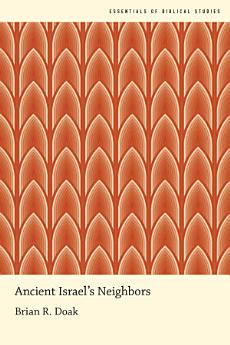Ancient Israel's Neighbors
កក្កដា 2020 · Oxford University Press
សៀវភៅអេឡិចត្រូនិច
176
ទំព័រ
family_home
មានសិទ្ធិ
info
reportការវាយតម្លៃ និងមតិវាយតម្លៃមិនត្រូវបានផ្ទៀងផ្ទាត់ទេ ស្វែងយល់បន្ថែម
អំពីសៀវភៅអេឡិចត្រូនិកនេះ
Whether on a national or a personal level, everyone has a complex relationship with their closest neighbors. Where are the borders? How much interaction should there be? How are conflicts solved? Ancient Israel was one of several small nations clustered in the eastern Mediterranean region between the large empires of Egypt and Mesopotamia in antiquity. Frequently mentioned in the Bible, these other small nations are seldom the focus of the narrative unless they interact with Israel. The ancient Israelites who produced the Hebrew Bible lived within a rich context of multiple neighbors, and this context profoundly shaped Israel. Indeed, it was through the influence of the neighboring people that Israel defined its own identity-in terms of geography, language, politics, religion, and culture. Ancient Israel's Neighbors explores both the biblical portrayal of the neighboring groups directly surrounding Israel-the Canaanites, Philistines, Phoenicians, Edomites, Moabites, Ammonites, and Arameans-and examines what we can know about these groups through their own literature, archaeology, and other sources. Through its analysis of these surrounding groups, this book will demonstrate in a direct and accessible manner the extent to which ancient Israelite identity was forged both within and against the identities of its close neighbors. Animated by the latest and best research, yet written for students, this book will invite readers into journey of scholarly discovery to explore the world of Israel's identity within its most immediate ancient Near Eastern context.
អំពីអ្នកនិពន្ធ
Brian R. Doak is Associate Professor of Biblical Studies and Faculty Fellow in the William Penn Honors Program at George Fox University, just outside Portland, OR. He is the author of four other books, including Heroic Bodies in Ancient Israel and Consider Leviathan: Narratives of Nature and the Self in Job, and the co-editor (with Carolina López-Ruiz) of The Oxford Handbook of the Phoenician and Punic Mediterranean.
វាយតម្លៃសៀវភៅអេឡិចត្រូនិកនេះ
ប្រាប់យើងអំពីការយល់ឃើញរបស់អ្នក។
អានព័ត៌មាន
ទូរសព្ទឆ្លាតវៃ និងថេប្លេត
ដំឡើងកម្មវិធី Google Play Books សម្រាប់ Android និង iPad/iPhone ។ វាធ្វើសមកាលកម្មដោយស្វ័យប្រវត្តិជាមួយគណនីរបស់អ្នក និងអនុញ្ញាតឱ្យអ្នកអានពេលមានអ៊ីនធឺណិត ឬគ្មានអ៊ីនធឺណិតនៅគ្រប់ទីកន្លែង។
កុំព្យូទ័រយួរដៃ និងកុំព្យូទ័រ
អ្នកអាចស្ដាប់សៀវភៅជាសំឡេងដែលបានទិញនៅក្នុង Google Play ដោយប្រើកម្មវិធីរុករកតាមអ៊ីនធឺណិតក្នុងកុំព្យូទ័ររបស់អ្នក។
eReaders និងឧបករណ៍ផ្សេងទៀត
ដើម្បីអាននៅលើឧបករណ៍ e-ink ដូចជាឧបករណ៍អានសៀវភៅអេឡិចត្រូនិក Kobo អ្នកនឹងត្រូវទាញយកឯកសារ ហើយផ្ទេរវាទៅឧបករណ៍របស់អ្នក។ សូមអនុវត្តតាមការណែនាំលម្អិតរបស់មជ្ឈមណ្ឌលជំនួយ ដើម្បីផ្ទេរឯកសារទៅឧបករណ៍អានសៀវភៅអេឡិចត្រូនិកដែលស្គាល់។






